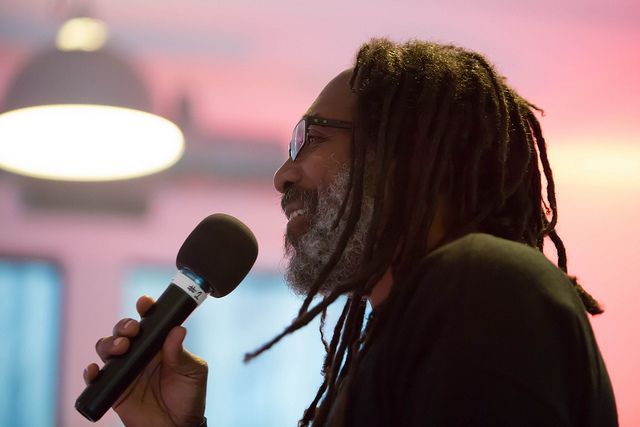Detroit’s Malik Yakini showcases social transformation through food
Concordia Transitions 2015, held on Sunday Feb. 8, was a day of events organized around a student-run food system for the university. Aside from providing an in-depth overview of Concordia’s food network, its history, and where it could go, the attendees were given the chance to hear from a series of speakers.
One of them was Malik Yakini, the executive director of the Detroit Black Community Food Security Network and member of D-Town Farms, an organic farm in the urban decay of the city. Equally knowledgeable in history and demographics as he is in farming, Yaniki painted a grim image of his home city and its hopeful start towards redemption through the narrative of food.
The current crisis, according to Yakini, is due to Detroit’s civic collapse and decades of intentional policy against its non-white denizens. Depending on who you ask, around a third of the city now lies empty—the result, Yakini said, of both economic implosion and white flight to the suburbs in response to non-white migration into the industrial heart of the city. (Detroit is listed in the 2010 United States Census as 82.7 per cent African American or Black.) Unemployment figures—a result of what Yakini called “intentional disinvestment”—vary widely depending on who is asked, at anywhere from 20 per cent to over 50 per cent. To a large extent the decay has affected the less affluent, mostly Black population of the city. From a food perspective, what has happened is a disaster.
“As of 2007, the last national grocery store chain closed its doors in the city of Detroit,” said Yakini. The remaining network of grocery stores are deemed by Yakini to be exploitative, not to re-invest into the local community, and of inferior quality.
Organizations like D-Town farms—currently occupying a two-acre location in Detroit’s Rouge Park—see the emptiness as fallow ground waiting to be reclaimed. But to rebuild (and make it better than before) requires more than soil and seeds. It requires a change in spirit.
“The work that we do is guided by values,” he said. “Love is the overriding value that guides everything we do.” Yakini believes what’s required is a re-thinking of our place in the world, of humans as part of the ecosystem and not having dominion over it.
“This idea that human beings were put here to have dominion over the earth is a very eurocentric idea. And so we also have love for the other animals and plants with which we share the planet, and we have an understanding that our survival is dependent on us understanding that we’re part of this matrix of life that includes the other life forms with which we share the planet,” he continued. “We thought that one of the things that we could do is really promote the growing of food as a way of filling that gap.” Filling that gap has meant re-educating his community on the importance and nobility of working with food—all the way to the root: “We now understand that significant and deep societal change is intergenerational. One of our goals from the very beginning was to involve youth in the food movement. It’s very important that we have young people who see work in the food system as being valuable work, because there’s all kinds of class implications about farming in particular. Some people see farming as lower-class work.”
As befits a community disadvantaged under the current system, Yakini’s food movement breaks from the past on two issues: first, in opposition to what he calls the entrenched and universal system of white supremacism which privileges the descendents of mostly western Europeans; and second against capitalism, which Yakini has called a method that exploits land, labour, and wealth transfer independent of merit or fair work.
“There are many concepts in capitalism that are unsustainable,” he said, citing unending growth and the belief in perpetual strife over resources. “That thinking is going to lead to our destruction. We think that there is an abundance on the Earth, but we just have to change our thinking and change how those resources are distributed.”
“One of the problems with the food system is that it’s become so large that local communities can’t benefit from it and it is fragile because of its scale,” he said.
By reclaiming the city one acre at a time, Yakini’s dream is to empower and create an alternate system of civic mindedness and equality for both his community and those who choose to stand in solidarity with it.
Their methods and successes have attracted a widespread following, something that still surprises Yaniki.
“We certainly didn’t set out to be celebrities; we set out to improve the conditions in our communities. It’s mind-boggling to go places and meet people who know what we’re doing and who are inspired by it, because that was not our intent. Our intent was to make the conditions in our community better.”
Nor does Yaniki see himself as deserving of any particular praise: “I always like people to know that although I am the chief spokesman for the group, I’m representing a collective of people who work very hard.”




